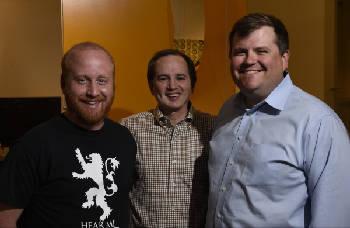Entrepreneurship Hall of Fame 2016

Karen Hutton
Karen Hutton sets a high standard for entrepreneurs. The Tennessee native with a visionary mind, strong work ethic, generous spirit, and desire to promote equality, models herself after her parents, David and Jean-Marie Hutton.
Upon graduation from the University of Alabama, Karen relocated to Houston where she began her career by leasing commercial spaces. In 1992 she made her way back to Pulaski to work for the family business, refining any and all daily operations as well as managing 21 shopping centers. In 1994 Karen won her first bid with AutoZone, the first of many, serving as a catalyst for her career. In 1996, Hutton moved forward with characteristic fearlessness and great success to found the Hutton Company, which developed 263 Dollar General stores, spanning across 7 states in only 4 years.
Karen holds a deep-rooted belief that "an education, a good work ethic, and a positive attitude lay the groundwork for success and changing one's environment." Her dedication and desire to help others was acknowledged in 2014 as the Hutton Companies proudly received the Corporate Philanthropist of the Year award.
Most recently, the Hutton team set company records by developing 36 grocery stores in 24 months as well as developing their largest project to date, an 88 acre, 88 million dollar open air center in Mobile, AL. "These are great examples of what happens when you work alongside great people and encourage them to do what they do best." In 2015, Hutton's construction volume was 176 million dollars. The Hutton Companies own 208 development properties in 25 different states with 3,791,116 square feet for a total portfolio value of 800 million dollars. Karen currently resides in Chattanooga, Tennessee and spends her days continuing to grow her business and invent new ways to be the best in her field.

Ted Alling, Allan Davis, and Barry Large
Friends and fellow Samford University students Ted Alling, Allan Davis, and Barry Large had talked about going into business together while in college. The three even went so far as to research the viability of opening a single Smoothie King location as part of a senior project. Unfortunately, the research revealed that there wasn't enough profit in it to make it worth their while. So the three went their separate ways after graduation, temporarily putting on hold their entrepreneurial dreams.
Fortunately, their passion for business soon led them to the opportunity to start their own company.
Large joined his family's brickyard business, Key-James Brick and Supply, in the finance department while Alling went to work in sales for freight transport broker CH Robinson. Alling soon saw a business opportunity in freight brokering and approached Large about testing the concept with his family's business. (Freight brokers are given a budget for transporting goods and are responsible for finding a trucking company willing to do it for less than the budgeted amount; the difference is the broker's payment.)
Access America Transport was born in 2002 in a glorified closet on the property of Key-James Brick. Access was initially responsible for moving about 10 loads a day from brick manufacturers to the brickyard, taking a percentage of the cost to transport each load.
About a year later, Davis came on board to help the company diversify. "The first year, the brickyard was a large portion of our business," says Large, "and our goal was to reduce our reliance on that business."
By 2010, Key-James Brick was a fraction of 1% of Access America's sales, which were approximately $100 million. By 2013, that number swelled to $500 million.
Looking back on their success, Large believes their complementary skillsets were a big advantage. Davis was the creative genius, with analytical skills that could see how to do things differently, Large says. Alling was the extroverted salesman who drove the culture of the company, while Large was the financial mind responsible for keeping the train on the tracks. "We operated as a unified unit but stayed out of each other's hair," he says. Because they were first friends, they trusted each other implicitly.
They also built an entrepreneurial culture, organizing sales people in pods of 4-5 brokers who were effectively responsible for running their own internal businesses. Employees were rewarded for sales growth and profitability.
That approach allowed Access America to double sales every year except two.
By 2010, the co-owners had started to explore ways to support other start-up ventures, mainly through early stage investing. They could envision a time when they wouldn't be running Access America and, in 2012, started the Lamp Post Group, a local business incubator, which they ran alongside Access America.
In 2013, the owners started talking to Coyote Logistics, another large transport company, and discovered the two enterprises were culturally similar and both poised to go public. Instead, they decided to merge the two companies, which was subsequently sold to UPS in 2015.
At that point, Alling, Davis, and Large turned their full attention to Lamp Post. To-date Lamp Post has made a number of investments in early stage companies. One success story is Bell Hops, "the Uber of moving," which recently received a $175 million valuation.
The three have also started Dynamo - a nod to Chattanooga being called "the Dynamo of Dixie" - which is a venture fund for tech startups in logistics. "We've shifted from an incubation model that is Chattanooga-centric to more of an industry focus," explains Large, "and we're actively pursuing more investments."